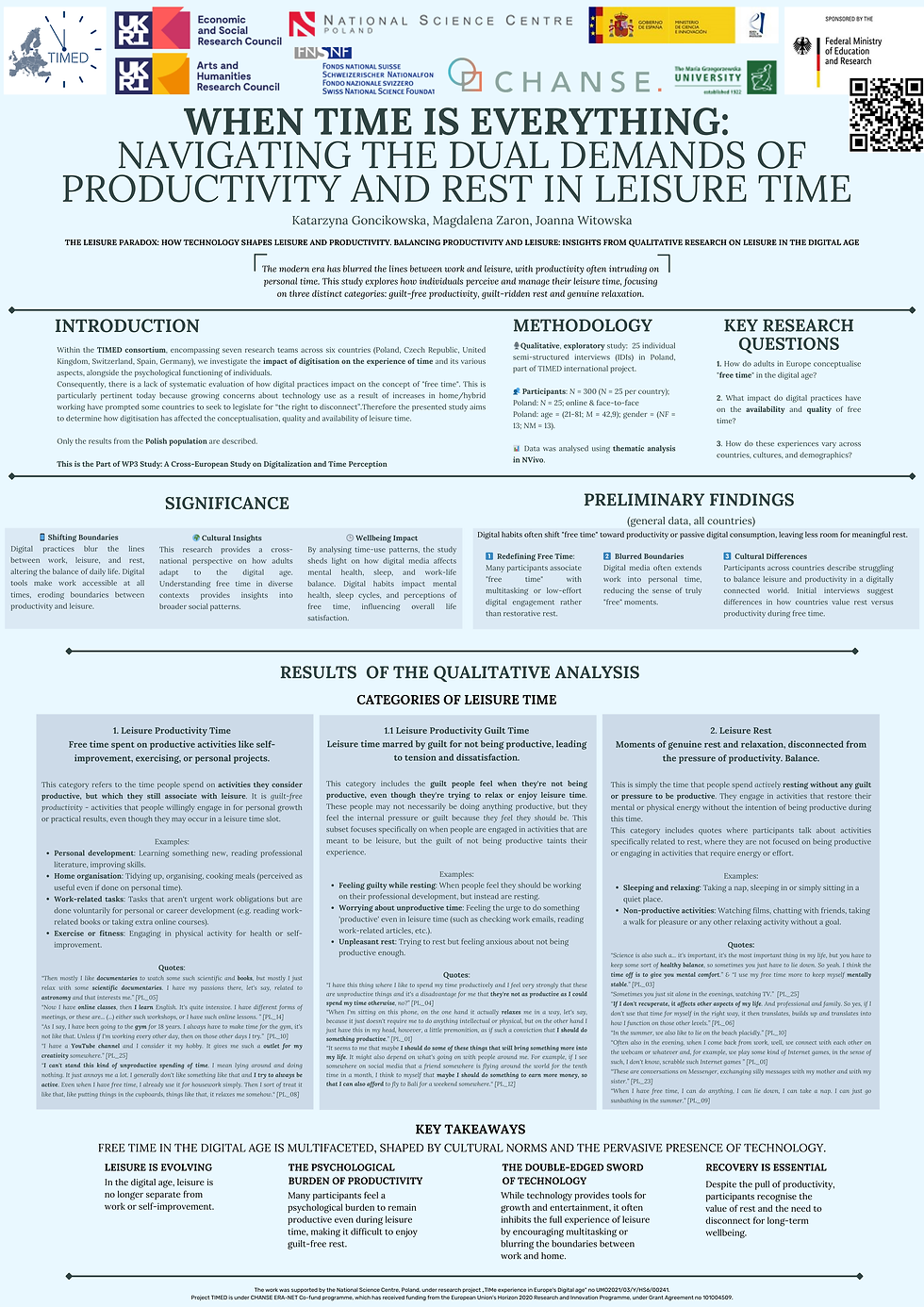Exploring the Intersection of Artificial Intelligence and Social Research
- Katarzyna Goncikowska

- Dec 4, 2024
- 3 min read
📍 Centrum Nauki Kopernik, Warsaw, 21-22 November 2024
We had the honor of participating in the conference Artificial intelligence and modern technology in social research ("Sztuczna inteligencja i nowoczesne technologie w badaniach społecznych"), organised by the Institute of Psychology of the Polish Academy of Sciences in collaboration with Centrum Nauki Kopernik. This event brought together researchers to discuss the impact of AI and modern technologies on society, with a particular focus on young scientists and early-career academics.

As part of the TIMED project, Katarzyna Goncikowska, Magda Zaron, and Joanna Witowska, presented our poster titled "The Leisure Paradox: How Technology Shapes Leisure and Productivity." The presentation explored three distinct categories of leisure time identified in our WP3 study:
Leisure Productivity Time – Activities combining leisure with personal growth or self-improvement, such as exercising or learning new skills.
Leisure Productivity-Guilt Time – Leisure tainted by the psychological pressure to be productive, leading to dissatisfaction.
Genuine Leisure Rest – Moments of restorative rest, free from the burden of productivity.
Our findings reveal the complex interplay between digital tools, work-life balance, and mental health in shaping modern leisure practices. This Polish-focused research is part of a larger European study within TIMED, aiming to deepen our understanding of the digitalisation of time perception.

Participants offered different perspectives on how they view productivity in their leisure time, revealing a complex relationship between leisure, self-improvement and societal expectations.
Many participants expressed a desire to engage in productive activities in their free time. They often feel social or self-imposed pressure to make the most of their leisure time, sometimes leading to a sense of guilt for not being productive. This was illustrated by participants who mentioned wanting to balance relaxation with productive activities, reflecting a common belief that leisure time should still yield benefits or achievements.
Participants expressed mixed feelings about how they spend their leisure time. While some seek productive leisure - such as exercise, reading or learning new skills - others recognise the importance of relaxation without a focus on productivity. This suggests a recognition that both productive and non-productive leisure can be valuable in different ways.
The influence of social media was evident, with participants feeling pressure to align their leisure activities with those presented online, such as yoga or self-care routines. This can create a standard of productivity in leisure time that is not necessarily achievable or desired by everyone, fostering a sense of inadequacy or motivation to be more active in leisure time.
Many participants highlighted the importance of engaging in leisure activities that are fulfilling and enjoyable, rather than simply productive. This included engaging in hobbies out of personal interest, such as dancing or creative projects, highlighting the idea that volunteering for enjoyable activities can lead to personal growth and fulfilment, even if they are not traditionally seen as 'productive'.
There was a marked tension between wanting to be productive and needing to rest. Some participants acknowledged that while they would prefer to spend their free time productively, they also recognised the need for downtime, especially after a busy day. This balancing act illustrates the complexity of modern life, where both relaxation and productivity are essential for overall wellbeing.
These results reflect a wide range of attitudes towards productivity in leisure time, highlighting the challenge of balancing societal expectations with personal desires for relaxation and meaningful engagement. This theme highlights the multifaceted nature of leisure, with both productive and non-productive activities contributing to an individual's overall life satisfaction and well-being.
Beyond presenting our research, the event was also captured through the lens of Katarzyna Goncikowska (Svartdvale), member of the TIMED team, PhD student (IP PAN & GSSR), and a professional photographer. We captured moments of vibrant discussions, workshops on leveraging AI for social research, and the engaging atmosphere of both days. Selected photographs from the sessions and workshops will accompany this post to highlight the spirit of collaboration and innovation.
This experience provided an invaluable opportunity to exchange ideas, connect with fellow researchers, and bridge gaps in interdisciplinary approaches. We thank the organizers for fostering such an enriching platform and look forward to further collaborations.
Stay tuned for more insights from the TIMED project as we continue to explore the digital transformation of time and society.








































































































































































































Comments